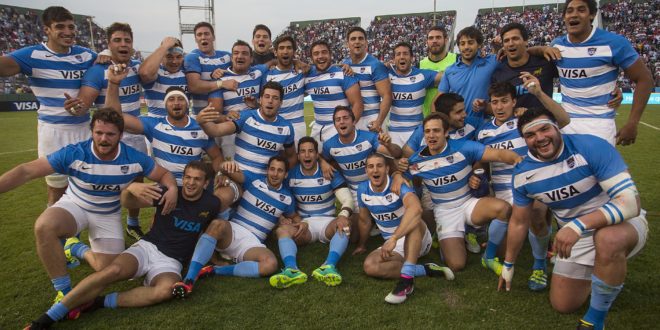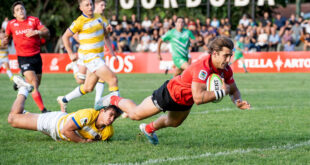When it comes to countries deserving an opportunity to host a RWC Argentina is near the top of the list. Argentina is the only Semi Finalist in Rugby World Cup history that has never hosted a RWC match and the Americas is the last remaining region to host a RWC tournament.
There are a range of possibilities of a hypothetical RWC in the Americas, including hosting the tournament in individual countries or a co-hosting arrangement.
The present article is the fourth in the series and considers Argentina as a hypothetical single host for RWC 2027 or 2031. The reason for either is that World Rugby has hinted that the hosting rights to RWC 2031 will be determined together with RWC 2027. This would replicate the RWC 2015 and 2019 decision.
To access the Rugby World Cup in the Americas: USA article click here.
To access the Rugby World Cup in the Americas: Canada article click here.
To access the Rugby World Cup in the Americas: Canada and USA article click here.
RWC HOSTING CRITERIA
A requirement of bidding to host a RWC is to have government support. A hypothetical RWC 2027 or 2031 in Argentina would thereby require the backing of Argentina’s new president, Alberto Fernández. At present it is unclear whether his regime would back the UAR to bid for hosting rights. Former president, Mauricio Macri met with World Rugby authorities over the possibility.
In 2017, during Macri’s presidency, Argentina was targeting winning the hosting rights to RWC 2027. At that time it was confirmed that it would cost US$200 million to host. By way of comparison, RWC 2019 brought over US$4 billion into the Japanese economy.
The financial standing need not mean that the host union is required to be wealthy. Indeed, while RWCs 2015 and 2023 were decided with this factor clearly involved, the criteria did not influence the decision making for RWCs 2011 or 2019. Moreover, the financial power of Japan as a country is one consideration and the JRFU is another. On these grounds the UAR has a strong financial standing.
The host country and union do not profit from the RWC package of tv rights or advertising. That revenue goes to World Rugby. What the host does acquire is the ticket revenue.
In order to be a candidate World Rugby requires a stadium seating 60,000 spectators for the RWC Final. There is no official size for the remaining venues, which has seen hosts given the liberty to utilize a range of different sized venues. Under the existing hosting model, which began in 2003, RWCs 2003, 2011, 2015 and 2019 all involved venues with capacities under 20,000.
For RWC 2023 the smallest venue is to be Toulouse, which seats 33,150 spectators. It is one of nine venues with Paris, Marseilles and Lyon all seating 60,000 or more.
RUGBY HOSTING EXPERIENCE
Argentina is yet to officially ever bid to host a RWC. It was to do so for RWC 2023, yet decided against it with Agustín Pichot noting the difficulty of following Japan 2019 when France was among the bidders.
Unlike many Tier 1 sides, Los Pumas play home matches at a variety of venues. This has seen matches spread nationwide and can operate as a test for Argentina’s abilities to host major rugby fixtures in different locations.
The record home attendance recorded for Los Pumas is above the 60,000 capacity requirement. Crowds of 59,000 to 65,000 were recored for Argentina vs South Africa, New Zealand and Australia for end of year tour matches in 2000, 2001 and 2002 at El Monumental (River Plate Stadium) in Buenos Aires.
Since joining the Rugby Championship, Los Pumas have played one match in the Greater Buenos Aires region per year. This included La Plata which had an attendance of 40,207 in 2012. There were 41,149 in attendance for Argentina vs Australia in Rosario that year and the record rugby attendance at Mendoza of 37,679 is expected to be beaten this year when Los Pumas host the All Blacks.
Vélez Sarsfield has had 50,000 attendances for Pumas test matches in the past but presently operates on a reduced capacity of 34,768 for safety reasons.
WHERE TO HOST RWC MATCHES
Argentina has two professional teams – Los Jaguares in Super Rugby and Los Ceibos in SLAR. They play in Buenos Aires and Córdoba respectively. Both cities would be certainties to host RWC matches for a hypothetical Argentina 2027 or 2031. The following video, which I made in 2015, offers a sample of potential stadiums for RWC in Argentina.
ACCESSIBILITY
Rugby matches in Argentina over the years demonstrate that there is a market for a RWC in Argentina. Buenos Aires would be the hub for the tournament, with it certain to stage the hypothetical tournament opener, final and possibly also both Semi Finals.
Argentina is the eighth largest country in the world in terms of size and the 31st regarding population. None of the country’s major cities are located south of Buenos Aires province. This means that few matches would be allocated in regions including Patagonia or Tierra del Fuego.
VENUE SELECTION
There are multiple considerations for the number of venues for a RWC in Argentina. To simplify matters let us assume that the 20 team model will remain in use. While the number can be debated, thirteen venues is arguably appropriate to service the needs of the country and World Rugby.
Argentina’s home test matches are determined by a number of factors, with one notable one being that the UAR works together with local councils. In effect, this means that cities or provincial governments bid to host Los Pumas. With an influx of visitors for a RWC it is logical to assume that they would bid to receive RWC matches.
Of note is that Argentina need not construct any venues. They could use existing ones or have some altered. This would depend on the work with the bidders. Work would also replicate prior RWCs in that venues would need to be made available on specific dates for rugby, but not necessarily throughout the entirety of the tournament.
There would be no need to regionalize pools. The overall distances are manageable, although there would be the use of venues near one another for specific teams. For instance, Ireland could play their first two matches in Mendoza before traveling to San Juan for game three and then finishing the pool phase in Córdoba; and England could begin in La Plata and play subsequent pool matches in Buenos Aires, Santa Fé and Santiago del Estero.
Sample host cities and venues are displayed below:
| CITY | VENUE | CAPACITY |
| Buenos Aires | River Plate | 61,618 |
| Buenos Aires | Vélez Sarsfield | 35,000 |
| La Plata | Ciudad de La Plata | 41,000 |
| Mar del Plata | Estadio José María Minella | 35,180 |
| Rosario | Estadio Gigante de Arroyito | 41,465 |
| Santa Fé | Brigadier General Lopez | 40,000 |
| Resistencia | Estadio Centenario | 25,000 |
| Córdoba | Estadio Mario Kempes | 57,000 |
| Santiago del Estero | Estadio Unico | 28,000 |
| Mendoza | Estadio Malvinas Argentinas | 42,000 |
| San Juan | Bicentenario | 25,000 |
| Tucumán | Monumental José Fierro | 32,000 |
| Salta | Padre Ernesto Martearena | 20,408 |
VERDICT
Argentina has the infrastructure and know-how to host RWC over the coming decade. The country hosted the 1978 FIFA World Cup and last hosted the Copa América in 2011; venues were upgraded for the latter of these tournaments. Of the above thirteen venues, Tucumán certainly would require work. Without it another option would be chosen, potentially Jujuy.
While it is certain that a RWC in Argentina would begin and end in Buenos Aires, there would be decisions required for the remaining play-off’s matches. La Plata, Rosario, Córdoba and Mendoza all offer appropriately side venues for the Quarter Finals.
| FIXTURE | VENUE |
| Quarter Final 1 | Rosario |
| Quarter Final 2 | La Plata |
| Quarter Final 3 | Córdoba |
| Quarter Final 4 | Mendoza |
| Semi Final 1 | Buenos Aires (River Plate) |
| Semi Final 2 | Buenos Aires (River Plate) |
| Bronze Final | Buenos Aires (Velez) |
| RWC Final | Buenos Aires (River Plate) |
 Americas Rugby News Rugby news from across the Americas!
Americas Rugby News Rugby news from across the Americas!




